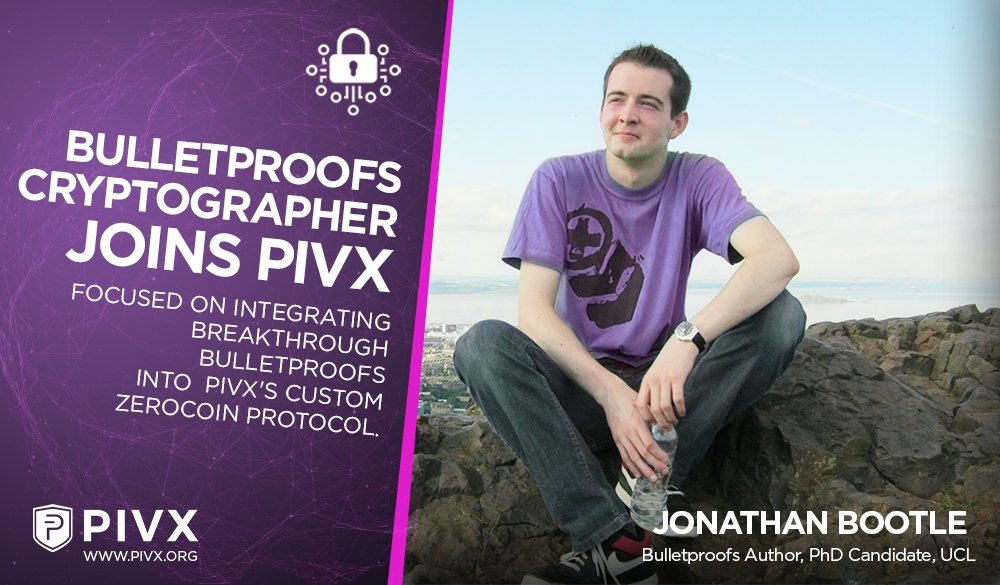Why PIVX? Why did you choose to work with us?
I chose to work with PIVX because I thought my skills were a good match for the development team, and I was impressed by the high level of activity and community driven development that I saw.
What do you see in PIVX that makes it attractive considering your work?
There are a lot of places where zero-knowledge proofs could be incorporated and, I think, lots of scope for cool protocol optimisations.
With Bulletproofs added, what will be the major improvement it will bring? Considering other privacy coins how will it set us apart?
I think that the largest benefit will be additional privacy, without the added zero-knowledge proofs compromising efficiency too much.
Mary: Was her being part of PIVX a drawing factor and what areas of Bulletproofs is she working on?
Mary’s involvement is a massive plus for me. She was already a colleague and has experience working on zero-knowledge proofs and cryptocurrencies, so I was confident that there would be somebody on the team on the same wavelength.
How did you first learn about PIVX? Was there anything particular about the project that attracted you or piqued your interest?
I first learned about PIVX from a friend on the development team. I was particularly impressed by their strong brand image and the high levels of activity among their development community.
Do you think the average person today underestimates the necessity for privacy online, especially on a blockchain?
Absolutely. The amount of personal information that can be inferred from online activity is really startling. Further, even if our data is safely stored and not accessed at present, we don’t know how it might be used in the future when laws and attitudes towards today’s typical online activities might have changed significantly. This is especially important with public blockchains which anybody can access and store.
In a recent podcast, you talked about the trusted setup that Zcash uses. Do you think that the public at large will ever be able to fully trust this arrangement, or will there always be a seed of doubt?
However small, there’s always a chance that something went wrong with the trusted setup ceremony. It’s possible that the risk could be mitigated in future by using new techniques to refresh the setup information.
What do you think is going to be the most important aspect or selling point for cryptocurrency that could stimulate mass adoption in the future? Will privacy be among them, if not the main attraction point?
While privacy is very important, I think decentralisation and public verifiability are likely to be much bigger factors in stimulating mass adoption, helping to create payment systems which are more resistant to tampering, much easier to audit and work without reliance on third parties. I think that lots of people care about privacy, most of all when things go wrong, but it is much easier to feel the immediate benefits of convenience than privacy every day when systems are working correctly, and that this will have more of an impact on encouraging adoption.
In simple terms, what is the key difference between bulletproof and zero-knowledge proofs? Is one inherently better?
Zero-knowledge proofs are protocols that allow you to convince somebody that a statement is true, without giving away all of the details. Bulletproofs is an example of a zero-knowledge proof, so there’s no difference, as such. That said, bulletproofs do have some nice features. They are powerful and efficient but use simpler mathematics than other comparable zero-knowledge proofs. They also have some nice optional features built in, which can help support CoinJoin-type methods.
Are there any unique difficulties in combining bulletproof’s with PIVX’s proof-of-stake consensus model? Is there anything about proof-of-stake that could cause issues with maintaining privacy? What about proof-of-work?
At the moment, I can’t see any unique difficulties. Bulletproofs is an efficient, general-purpose zero-knowledge proof for a wide variety of different tasks. The idea is to look for places in the PIVX system where zero-knowledge proofs are required to get the correct functionality or privacy levels, or places where they could be added, and then use bulletproofs to do things efficiently. When viewed as a nice add-on to be incorporated, I don’t think there would be any issues caused by adding bulletproofs.
Where do you see PIVX in the next 10 or even 20 years? Not just in financial terms, but also in technical terms.
On the technical side, within the next few decades, as developments in quantum computing come closer to practical reality, I would hope to see PIVX and other cryptocurrencies adopting more and more cryptographic solutions which are secure against or resistant to attacks by quantum computers. In financial terms, of course, I’d like to see PIVX adoption become more and more widespread and continue to cement its position among all of the cryptocurrencies out there.
In the recent podcast, you mentioned that you’ve been spending a lot of time recently thinking about regulation of privacy coins. If governments do come in and attempt to regulate decentralized projects, what recourse do you think they will have?
That depends on the form of regulation. I’m not sure what recourse would be most effective against aggressive taxation, for example. Avoiding regulation completely seems very difficult, and ultimately likely to make governments more hostile and push decentralised projects underground. I think that the best thing to do is work hard before regulations come into force, to try and increase awareness of the benefits of these projects and encourage adoption to the point where cryptocurrencies and blockchain technologies become ubiquitous. In my opinion, the higher the awareness and the better the image of privacy coins in the minds of average people, and government officials, the more likely it is that regulation will be fair and sensible.
In the future, do you imagine that there will be an arms race of sorts for online and cryptocurrency privacy of the people versus perhaps governments?
I certainly hope that this does not happen. One of my colleagues has talked about a commercialized future where people pay more in order to enjoy better privacy. I wonder if we are more likely to see a slow movement towards the increased use of commercial products to protect privacy and reduced legal protection of citizens’ privacy.
Which member of the team do you want to learn more about? Let us know on Twitter, Facebook, or join the conversation in Discord.



